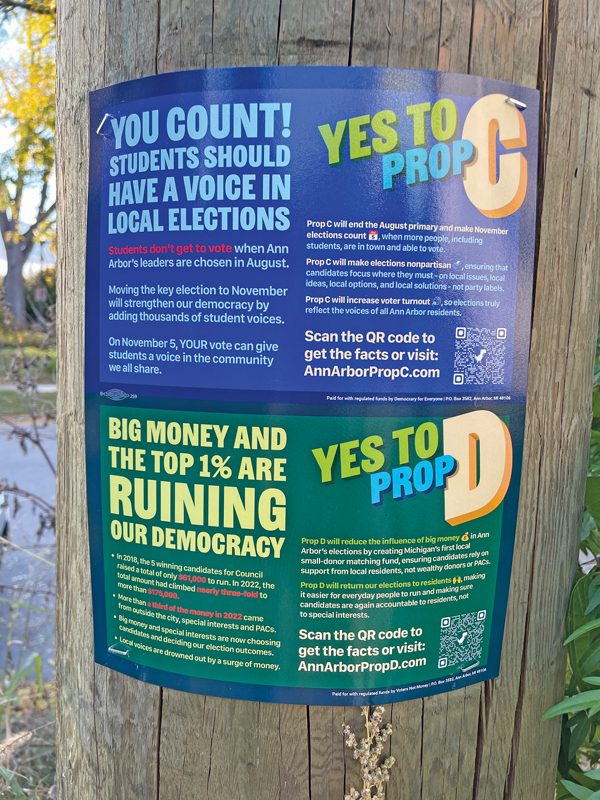In November, voters overwhelmingly supported two proposals placed on the ballot by city council: Prop A, authorizing the creation of a city sustainable energy utility, won 79 percent to 21 percent. Prop B, renewing a park maintenance and capital improvements tax, won 28 to 72 percent.
The numbers were reversed for the two election proposals. Prop C, which would have eliminated partisan labels and primary elections, earned just 28 percent of the vote. Prop D, to create public funding for council and mayoral candidates, went down 30–70 percent.
“The only proposals that surprised me were C and D,” says county clerk Larry Kestenbaum. “I thought that with the ballot language being as simple and appealing as it was, and that people in general don’t like political parties, that, given an opportunity to get rid of political parties, they would jump for the chance.
“And,” he laughs, “I was completely wrong!”
Related: Election Revolution?
“Locally things are good,” says mayor Christoper Taylor. Council’s former opposition faction concentrated on the ballot proposals, leaving all five wards uncontested. Four activist incumbents and one new supporter received 98 percent of the votes. And the charter amendments worked out the way he’d hoped.
“I’m glad that the voters rejected these measures,” says Taylor of C and D’s defeat. “They were unwise. They would’ve harmed our electoral process. And voters recognized it.” In the mayor’s opinion, the outcome was so lopsided “because the proposals were inherently and fatally flawed.”
Props C and D spokesperson John Godfrey blames their defeat on “a well-executed, careful, extremely well-funded campaign of partial truths, of misstatements, of deliberate calculated deceit.” In particular, he believes that an oversize mailer that gave the impression that Donald Trump supported C and D “has the fingerprints of our elected leaders all over it.”

A Lansing union sent out a fake mailer suggesting that Donald Trump wanted the election changes to put “conservative and Republican voices” on city council. | Photo by John Hilton
The only identifiable fingerprints on the mailer belong to the Michigan branch of the Laborers International Union of North America (LiUNA): The “Make Michigan Great PAC” sounds like a Trump project, but it shares the union’s Lansing address, and was mailed using a union account. Taylor and his allies didn’t disown the fake, but he calls it “nonsense” to say they directed it.
“We ran a solid education campaign, and the overwhelming majority of Ann Arbor voters recognized that C & D would have harmed our electoral process and wasted city resources,” Taylor emails. “Blaming ‘disinformation’ for a 70–30 loss is election denialism, an insult to voters’ intelligence. Fortunately, Ann Arbor showed in 2020, 2022, and 2024 that it’s pretty tired of local conspiracy theories.”
Knowing what he knows now, Godfrey says he would have started campaigning sooner. And he says, “This isn’t going to end”—the proposals will be back “in some form.”

An authentic C and D poster charged that “Big money and the top 1% are ruining our democracy.” | Photo by John Hilton
“I’m delighted that Ann Arbor is so committed to climate action,” says Taylor of Prop A’s passage. “We have over the course of just a couple of years taken incredible steps toward accomplishing our carbon neutrality goals. The passage of Proposal A means that the city will be able to roll out a sustainable energy utility to provide for folks who sign up for 100 percent renewable, reliable, resilient energy and electricity and will be able to provide energy efficiency programs, and ultimately geothermal, at what we believe to be low market prices.”
While happy with the local outcome, the mayor warns that Ann Arbor isn’t insulated from the national results: “The ability to do things as a municipal organization with a Biden administration, or as would be a Harris administration, is very different than what we were able to do under a Trump administration and will be able to do under a Trump administration.”
Washtenaw County’s Public Safety and Mental Health Preservation Millage renewal passed with nearly 70 percent of the vote, a bit more than it got when it was first approved in 2018. The renewed tax will raise $22.5 million its first year and extend its funding through 2033.
The millage survived its biggest challenge before it went on the ballot. “By the time it was coming around to be renewed there was the notion of, ‘Why are we giving all this money to the police? We should just give it to mental health,’” says Kestenbaum. But “a renewal has a much better chance [of passing] than a new millage.” The funding will continue to be split, with 38 percent going to community mental health, 38 percent to the sheriff’s office, and 24 percent rebated to cities and townships with their own police forces.
“I don’t know if Washtenaw County has seen too many millages that it does not pass—especially renewals,” says retiring sheriff Jerry Clayton, who with community mental health director Trish Cortes was the guiding force behind the millage both times. “Despite the misinformation and all the silliness that happened at the board meetings throughout the year, people saw the value in the millage.”
Partially subsidizing the cost of his police patrols had strong support out-county, but the county’s top cop acknowledges it was “mental health [that] pulled this one across the line.” Cortes says she had faith it would be renewed because “there is such great support in this community, and such an acknowledgement of the need around mental health issues. … The vote does demonstrate the value that our community puts in mental health needs.”
Related: Tax Dollars at Work
After sixteen years as sheriff, Clayton is retiring at the end of the year. “My legacy is that we showed how a public safety organization, a sheriff’s office, can add tremendous value in a community beyond just law enforcement, beyond just putting people in jail,” he says. “And the millage passing is a byproduct of that legacy.”
Ann Arbor gets a rebate of more than $3 million a year from the millage. “We at the city of course are grateful for the unallocated rebate which we receive as a result of the millage,” Taylor says. “And I’m glad that the council has committed to another 40–40–20 resolution which will enable us to fund important services that have no other dedicated income stream.” Forty percent will help fund an unarmed crisis response program, 40 percent will go to the Ann Arbor Housing Commission for tenants’ mental health and other support services, and 20 percent will fund pedestrian and bicycle safety projects.
Three other county proposals also passed handily: Voters renewed millages for the county’s emergency communications system and veterans relief, and added an Older Persons Services Millage to provide additional funding for senior services.
In the two races for open judge seats, Jinan Hamood will join the 22nd Circuit Court after beating Jeffrey Worosz 66–34, while Kerene Moore defeated Tamara Garwood 59–41 for a seat on the 15th District Court.
As a political scientist, I didn’t understand why the reformers sought such a radical change. They might have been successful if they had simply proposed nonpartisan elections without getting rid of primaries. Grand Rapids has nonpartisan city elections. If there are less than three candidates, they are on the November ballot. With three or more, they are in an August primary on the same day as the political parties, and the top two will advance to a nonpartisan ballot in November. In the end, someone must win a majority.
A nonpartisan primary in Ann Arbor would remove the bias against those who choose a Republican ballot in August—not all of them are Republicans. Now, whoever wins the Democratic primary in Ann Arbor gets a free ride in November. This doesn’t address the concerns about money, of course.